Solidarity and steadfastness. These qualities were evident among Ukrainians long before missiles began pulverizing their cities early Thursday morning. They were on display again on Friday and Saturday in Taipei’s Xinyi District (信義), where hundreds of people gathered outside the building housing the Russian representative office.
Ukrainians were prominent among them. Some arrived in tears — on Friday, one young woman shook convulsively throughout, her bloodshot eyes betraying fatigue and distress. Many of those present had been up all night talking to friends and family. With each new arrival, there were hugs and timid smiles, yet the trepidation hung thick.
“My family are fine right now,” says Tanya Polyak, who like several of the young Ukrainian women present, works as a model. “Just a few hours ago they heard a loud explosion, but they didn’t feel anything.”
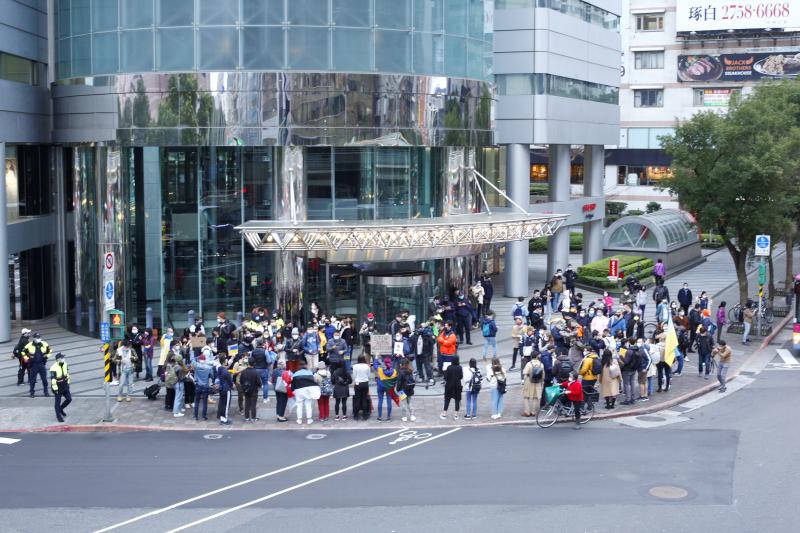
Photo courtesy of Yunjie Liao
Despite the looming threat, many Ukrainians expressed shock at the pace of the escalation.
“We thought [Russian President Vladimir] Putin was only showing muscle,” says Polyak. “My family is in Lviv, close to Poland, and there is already bombing 20 kilometers from the city. If it’s there that fast, we know it’s really bad.”
Natasha Bessavova, a 23-year-old model, echoed Polya’s surprise.
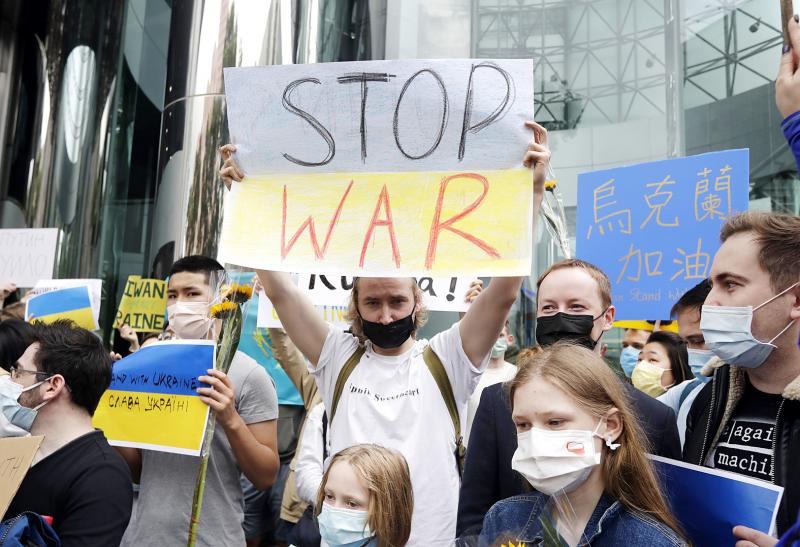
Photo: AP
“I’m speechless,” says Bessavova, who arrived in Taiwan at the age of sixteen. “When I saw the news, it felt like a dream. I’m most concerned for my brother as he’s in the military, and it’s hard to keep in touch,” she says.
Having seen action during Russian annexation of Crimea in 2014, her sibling had described the hellish scenes he encountered.
“He saw the dead bodies of his friends,” says Bessavova. “Many young men died there.”
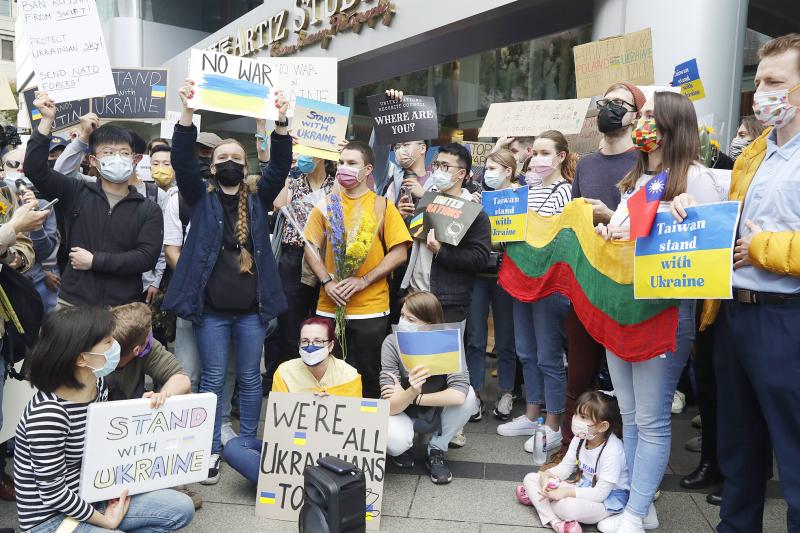
Photo: AP
Further emphasizing the apprehension that ex-pat Ukrainians are feeling, Taichung-based Ukrainian Yana Bass spoke of a chilling interaction with her mother. Her family live next to a military base in the central city of Kryvyi Rih, which put them in immediate danger.
“My mum had just woken up from the bombing sound as I called,” says Bass, who was unable to attend the demonstrations in Taipei. “There were four very loud explosions, which I heard myself. Windows were broken and a balcony collapsed. My mom was terrified and didn’t know whether to stay or go — both options were dangerous.”
Eventually, her mother hastily packed a bag with clothes and any documents that might be required and fled to a relative’s house with Bass’s 90-year-old grandmother in tow.
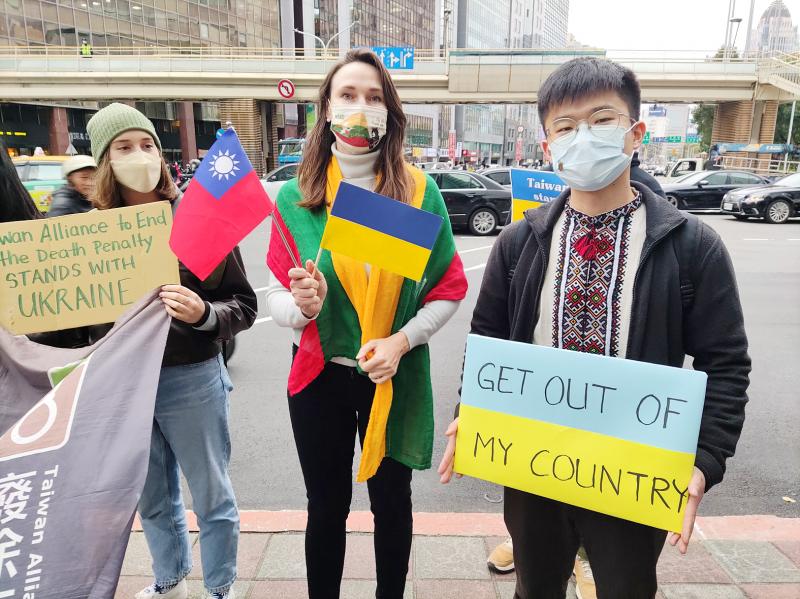
Photo: James Baron
ESCAPE ROUTES
It’s a familiar story. Artem Subotka, a Belarusian who has two sisters in Ukraine — one in the capital Kyiv, another in the southern city of Chernivtsi — was also in shock.
“People are preparing for the worst, hoarding food and gas,” he says. “Everyone’s keeping their passports with them at all times. My brother-in-law is getting the car ready.”
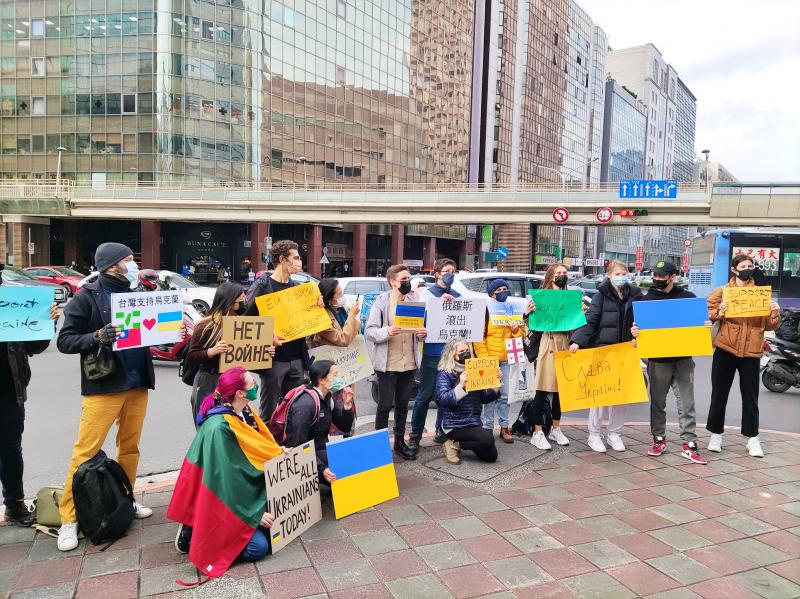
Photo: James Baron
Subotka is unsure which route his family will take out of the country if the time comes but is certain of one thing.
“Definitely not Belarus,” he says of his home country, whose dictator Alexander Lukashenko has reportedly already sent troops in Ukraine to assist the Russian invasion. “They will probably head south to Romania,” Subotka says.
Citizens of other former Eastern and Soviet bloc countries were prominent at the Taipei demonstrations. All spoke of the bond they felt with Ukraine.
“We’re neighbors, former Soviet countries, so we feel for them,” says Lali Shavelashvili, a 20-year resident of Taiwan who teaches synchronized swimming. Holding up her smartphone, she flicks through photos of a rally in the Georgian capital of Tbilisi which drew thousands in support of Ukraine. Given Russia’s invasion of the country in 2008, are there fears that the Georgia could be in Putin’s sights again?
“Not could be,” says Shavelashvili, who demonstrated here in 2008. “We’re definitely next, if they succeed with what they’re doing in Ukraine.”
FRACTURED RELATIONSHIPS
Fears that this is just the first step in Putin’s grand design are common.
“In Kazakhstan people feel this fear that imperialistic ideas are growing in Russia,” Temir Sakavov, a PhD student at National Tsing Hua University (國立清華大學) in Hsinchu. “But I wouldn’t say it’s growing among the people. It’s in leadership circles.”
Several Russians who participated in Friday’s event are keen to emphasize this point.
“Being Russian in this situation is hard because I feel how everyone just hates us,” says a woman named Lera, who like some other Russian participants declined to give her surname. “It’s like a national pain. I just want to scream ‘Why? It’s not about us!’ But then I try to understand people there are dying.”
Another Russian citizen named Alex shares this frustration.
“Unfortunately, I’ve already seen some Russophobia online — not directed to Putin, but Russians in general,” he says. “I can totally understand because Ukrainians are in such a situation right now.”
More than anything, he laments the damage done to personal relationships.
“It’s very sad to see how the Russian authorities have tried to diminish and destroy those connections over the last few years.”
FLY THE RUSSIAN FLAG?
Prior to Friday’s gathering, there had been online discussions among Russians about flying the Russian flag. This was vehemently opposed by some Ukrainian participants.
“Our cities are being sieged. If Russians in Taipei want to show solidarity, they should stand with us behind our flag,” said Oleksander Shyn, an activist with the Liberal Democratic League of Ukraine, a youth NGO. “I know some of those people truly want to demonstrate their demand for peace. But flying Russian flags is a no go.”
The issue became a sticking point, and while no official decision was made, “everyone was sensible enough not bring them,” says Shyn.
This disagreement aside, the presence of Russians at the two events was supported by all the Ukrainian participants.
“Support from them is the most powerful thing right now,” says Tanya Polyak. “If all of them get together, they can kill this government.”
Alex Khomenko a Ukrainian-American entrepreneur from Kharkiv in northwest Ukraine, who led a solo protest on Thursday, hours after the invasion was announced, says the blame lies squarely with Putin.
“He simply hates the idea of an independent Ukraine that is defying his desire to rebuild the Soviet Union,” he says. “But Ukraine will not go down. We will kick their asses.”

That US assistance was a model for Taiwan’s spectacular development success was early recognized by policymakers and analysts. In a report to the US Congress for the fiscal year 1962, former President John F. Kennedy noted Taiwan’s “rapid economic growth,” was “producing a substantial net gain in living.” Kennedy had a stake in Taiwan’s achievements and the US’ official development assistance (ODA) in general: In September 1961, his entreaty to make the 1960s a “decade of development,” and an accompanying proposal for dedicated legislation to this end, had been formalized by congressional passage of the Foreign Assistance Act. Two

Despite the intense sunshine, we were hardly breaking a sweat as we cruised along the flat, dedicated bike lane, well protected from the heat by a canopy of trees. The electric assist on the bikes likely made a difference, too. Far removed from the bustle and noise of the Taichung traffic, we admired the serene rural scenery, making our way over rivers, alongside rice paddies and through pear orchards. Our route for the day covered two bike paths that connect in Fengyuan District (豐原) and are best done together. The Hou-Feng Bike Path (后豐鐵馬道) runs southward from Houli District (后里) while the

March 31 to April 6 On May 13, 1950, National Taiwan University Hospital otolaryngologist Su You-peng (蘇友鵬) was summoned to the director’s office. He thought someone had complained about him practicing the violin at night, but when he entered the room, he knew something was terribly wrong. He saw several burly men who appeared to be government secret agents, and three other resident doctors: internist Hsu Chiang (許強), dermatologist Hu Pao-chen (胡寶珍) and ophthalmologist Hu Hsin-lin (胡鑫麟). They were handcuffed, herded onto two jeeps and taken to the Secrecy Bureau (保密局) for questioning. Su was still in his doctor’s robes at

Mirror mirror on the wall, what’s the fairest Disney live-action remake of them all? Wait, mirror. Hold on a second. Maybe choosing from the likes of Alice in Wonderland (2010), Mulan (2020) and The Lion King (2019) isn’t such a good idea. Mirror, on second thought, what’s on Netflix? Even the most devoted fans would have to acknowledge that these have not been the most illustrious illustrations of Disney magic. At their best (Pete’s Dragon? Cinderella?) they breathe life into old classics that could use a little updating. At their worst, well, blue Will Smith. Given the rapacious rate of remakes in modern